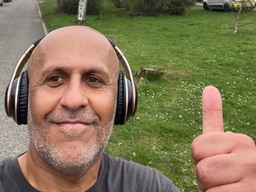Top tips for new pharmacy owners

Owning your own pharmacy may have been a dream since you started studying for the MPharm at university, but have you ever wondered what is the process like to be able to do it?
Pharmacist and solicitor Thorrun Govind led a talk at The Pharmacy Show in Birmingham last week (October 13) alongside National Pharmacy Association (NPA) chief executive Paul Rees, where they discussed some of the best tips and advice to start planning how you would go about purchasing a new pharmacy, selling it, or expanding your own portfolio.
The net total of community pharmacies has been decreasing in the UK, with a slide presented by Rees showing a decrease from 14,435 in 2019 to 12,982 this year.
Read more: Becoming a pharmacy store owner: Who is Rahul Sharda?
He highlighted Scotland had not had as many closing community pharmacies because “the funding model in Scotland is the best of the four nations”.
But he said the “the pharmacy business model is still buoyant despite the challenges”, and here are some of the areas himself and Govind shared to consider when buying and selling a pharmacy.
Contacts
Govind stressed that it’s “all about getting your ducks in a row” and it is “really important to get good advice early on”.
Key people to contact are solicitors, tax advisors, accountants, and membership organisations to be able to help you with the process of what to do during the process.
Brabners corporate partner Chris Peace joined the talk and listed three things you should look for in dealing with solicitors, including finding someone “who’s well connected”.
Read more: A nearby Boots pharmacy shut down – here’s how it impacted my business
“You'd be wanting someone who's done it before, and not learning how to do for the first time,” he said and added “looking for someone who is on the ball” and is proactive in emailing and getting things done.
Building a good relationship with a solicitor is important and Govind emphasised being on top of the contracts you have or need to arrange is useful so solicitors “can get things going as efficiently as possible”, as contracts “are the fundamentals of protecting and supporting your business”.
For example, managing your contracts for CCTV, waste disposal, and utilities is important and if you are selling your pharmacy, Govind said “having those easy to hand to support your solicitor is going to make you popular” so they are aware of everything you are managing in your pharmacy.
Finances
You need to be able to fund purchasing a pharmacy, and Govind stressed that you want to “make your bid stand out from the crowd”.
“Will you finance it yourself or go to a bank or financial institution?” she asked the crowd as one of the things to consider.
Govind added that you “need to think how much you can realistically borrow, comparing interest rates, need to be looking at the affordability of repayments, and need to be thinking about the current and projected performance of the target business”.
Read more: How one pharmacy is using tech to boost clinical capacity
All of this forms part of what she terms a “financial health check on the business” and it is essential to know what funds you will require “early on” to help deal with this.
An attendee from an accountancy firm also said the importance of an accountant would be useful in understanding “how much money you need to draw” as well as getting together “a cash flow plan or a profit projections”.
Govind also said “banks can also have their own solicitors so you will be responsible for the bank’s solicitors costs and your transaction costs”.
Due diligence
Doing as much due diligence ahead of a purchase is crucial in order to make the whole process run smoothly.
For example, Govind suggested thinking about whether “you will purchase a business using your personal name, as a limited company, or as a part of a limited liability partnership” as an example of the due diligence need to understand what the best option for you is.
Govind said that to start off with a purchase, “if there’s a third party landlord involved, you need to get some confirmation in principle from the landlord because not doing that early on could stop your transaction and slow things down”.
Following on from Peace’s advice on what to look for in a solicitor when approaching a pharmacy to buy, Govind added that “if you’ve got someone who’s an expert in this market, they will note the questions that need to be asked.
Read more: Red tape and rent gets between pharmacist and his Dorset pharmacy dream
“Because if you’re having a protracted back and forth, that is not in your best interest and it’s not going to speed things along and probably cost you a little bit more as well,” she added.
This is crucial when “releasing information to somebody else” about purchasing a pharmacy which would need “a confidentiality agreement in place” to do so.
Or when the buyer’s solicitor is drafting sale and purchase agreements to send to the seller’s solicitor to be reviewed.
Join a membership organisation
Most of Rees presentation highlighted what a membership organisation like the NPA can offer to prospective buyers.
He said that the NPA “works with around two thirds of pharmacies in the UK” and it provides “gold standard insurance” to its members.
The NPA has been underwriting insurance for community pharmacy for “over 100 years” and this covers areas such as professional indemnity, business and personal insurance to cover your pharmacy.
He added that the NPA had begun running master class events across the UK in the last six months to “show contractors how they can make generate more income for their business through the way that pharmacy first is delivered, through delivering more private services or clinical services”.
Read more: Teen tech whizz hailed ‘amazing’ by contractors after ‘maximising their profits’
This can be useful for pharmacy owners to know how to keep their business profitable, and Rees said owners can join members forums in their devolved nations to network with other pharmacies.
He also added that the NPA has a “hotline for pharmacy contractors” which can offer advice and support services which is “pretty much a one stop shop for all the queries you might have”.
If they want assistance with any issue around inspections, standards, product and manufacturer information, patient safety, ring the number,” Rees added.
The NPA also offers learning and development opportunities to pharmacy owners which includes General Pharmaceutical Council (GPhC) accredited training courses.







Please sign in
If you are a registered user on C+D Community, please sign in